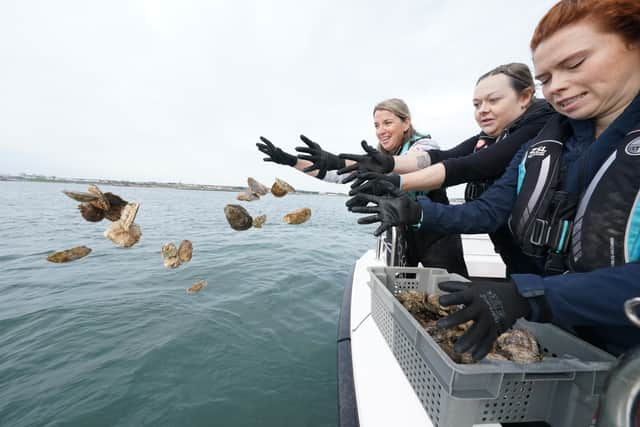North Sea: 10,000 native oysters the stars of new UK conservation clean-up project
and live on Freeview channel 276
Ten thousand unlikely heroes have been released by hand to a new football pitch-sized reef in the North Sea, in the hopes they will help filter pollutants from the water.
The Wild Oysters Project oversaw the construction of the new reef, which is a mile off Whitburn, Sunderland, and was made from 750 tonnes of local stone and scallop shells. Conservationists hope the reef will create a new marine ecosystem alongside the oysters, which have now been manually added to it.
Advertisement
Hide AdAdvertisement
Hide AdThe project, a partnership between the Zoological Society of London, Blue Marine Foundation, British Marine and local delivery partner Groundwork North East and Cumbria, has dubbed the molluscs the "superheroes of the oceans", with each little oyster able to filter 200 litres of water a day – enough to fill a bathtub.
Project manager Celine Gamble said the oyster release - which took place this week - was an important milestone in their journey to restore native oyster reefs to British coastlines.


“We’re optimistic that the 10,000 oysters will thrive, reproduce and grow on the new reef, which is the size of a football pitch, and we look forward to carefully monitoring their progress over the coming months," she said.
Oysters were once a popular delicacy on the North East coast - and were London's original street food - but national numbers have declined by over 95% since the 1800s, due to habitat loss, over-harvesting, pollution and disease.
Advertisement
Hide AdAdvertisement
Hide AdNone of the 10,000 oysters will be farmed or harvested for food, Ms Gamble said, and will instead be left to reproduce and potentially spread to other coastal waters.
“Native oyster reefs have disappeared from our British coastline, and with this, we have also lost the benefits that they bring, such as providing essential habitat for other marine species," she added.
“We’re determined to bring the species back from the brink of extinction, which will in turn help contribute towards healthier and more resilient coastal waters across the UK."
Despite their small size, oysters made a huge impact within their marine coastal environments, she said, especially in their ability to filter pollutants out of seawater. “This new reef will give the native oyster population a chance to recover and kick-start the population’s natural growth along our coastline.”
Comment Guidelines
National World encourages reader discussion on our stories. User feedback, insights and back-and-forth exchanges add a rich layer of context to reporting. Please review our Community Guidelines before commenting.
